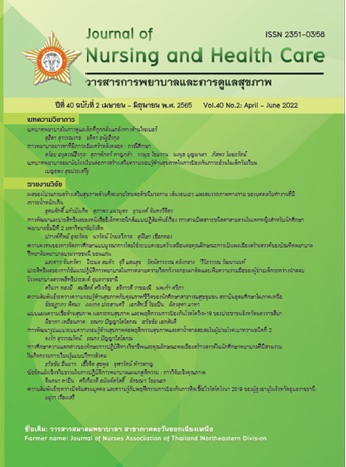การพัฒนารูปแบบระบบความรอบรู้ด้านสุขภาพต่อพฤติกรรมสุขภาพและค่าน้ำตาลสะสมในผู้ป่วยโรคเบาหวานชนิดที่ 2
คำสำคัญ:
การพัฒนาระบบ, ความรอบรู้ด้านสุขภาพ, ผู้ป่วยโรคเบาหวานชนิดที่2บทคัดย่อ
การวิจัยและพัฒนามีวัตถุประสงค์เพื่อการพัฒนารูปแบบระบบความรอบรู้ด้านสุขภาพต่อพฤติกรรมสุขภาพและค่าน้ำตาลสะสมในผู้ป่วยโรคเบาหวานชนิดที่ 2 การดำเนินการวิจัย 1) ทบทวนวรรณกรรม 2) พัฒนาระบบความรอบรู้ด้านสุขภาพ 3) การตรวจสอบและปรับปรุงระบบ 4) การทดลองใช้ระบบ กลุ่มตัวอย่าง คือ ผู้ป่วยโรคเบาหวานชนิดที่ 2 โรงพยาบาลหนองบุญมาก 30 ราย และโรงพยาบาลส่งเสริมสุขภาพตำบลสารภี 30 ราย ได้รับระบบความรอบรู้ด้านสุขภาพ โดยการเลือกแบบเจาะจง เครื่องมือการวิจัย ได้แก่ ระบบความรอบรู้ด้านสุขภาพ แบบสอบถามความรอบรู้ด้านสุขภาพและพฤติกรรมสุขภาพ และผลการตรวจค่าน้ำตาลสะสม สถิติที่ใช้ได้แก่ ร้อยละ ค่าเฉลี่ย ค่าเบี่ยงเบนมาตรฐาน One way ANOVA with repeated measures และ Paired sample t-test
ผลการวิจัย พบว่า 1) ความรอบรู้ด้านสุขภาพและพฤติกรรมสุขภาพมีทิศทางที่ดีขึ้น อย่างมีนัยสำคัญทางสถิติ 0.01 2) ภายหลังการทดลองผู้ป่วยโรคเบาหวานชนิดที่2 โรงพยาบาลหนองบุญมาก มีค่าน้ำตาลสะสมดีกว่าก่อนการทดลอง อย่างมีนัยสำคัญทางสถิตทีระดับ .01 3) การพัฒนาระบบความรอบรู้ด้านสุขภาพ ประกอบด้วย ปัจจัยนำเข้า ได้แก่ บุคลากร งบประมาณ การสื่อสารองค์กร ผู้ป่วย กระบวนการ ได้แก่ การประเมินบริบท การวางแผนพัฒนาระบบ การบริหารบุคลากร การสนับสนุนและอำนวยการ การสนับสนุนงบประมาณ ปัจจัยนำออก ได้แก่ ระดับของความรอบรู้ด้านสุขภาพ พฤติกรรมสุขภาพ ค่าน้ำตาลสะสม การตรวจสอบผลย้อนกลับ ได้แก่ การทบทวนและการปรับปรุงระบบ และการจัดการความรู้
สรุปและข้อเสนอแนะ: การพัฒนาและการนำระบบความรอบรู้ด้านสุขภาพสำหรับ ผู้ป่วยโรคเบาหวานชนิดที่ 2 ไปทดลองใช้ทำให้ผู้ป่วยมีความรอบรู้ด้านสุขภาพ มีพฤติกรรมสุขภาพ และค่าน้ำตาลสะสมที่ดีขึ้น หน่วยงานที่เกี่ยวข้องสามารถนำระบบความรอบรู้ด้านสุขภาพไปพัฒนาศักยภาพผู้ป่วยโรคเบาหวานในการควบคุมระดับน้ำตาลในเลือด
Downloads
เอกสารอ้างอิง
World Health Organization. Health Promotion Glossary. Geneva: WHO; 1998. p.1-10.
Nutbeam D. The evolving concept of health literacy. Social Science & Medicine Journal 2009; 67(12): 2072-8.
Rajatanavin R, Ningsanon T. (Editor). Self care when sick.in HimathongkamT. Full knowledge of diabetes. Bangkok : Printing of Vitayapat; 2011.
Office of the National Economic and Social Development Council. National economic and social development plan no 13: Transforming Thailand into progressive society sustainable value creation economy. Office of the National Economic and Social Development Council Bankok; 2021.
Diabetes World Health Organization. [Internet]. 2020 [cited 2021 August 26]. Available from : https:// www.who.int/news-room/fact-sheets/detail/diabe¬tes.
Mori Y, Futamura A, Murakami H, Kohashi K, Hirano T, Kawamura. Increased detection of mild cognitive impairment with type 2 diabetes mellitus using the Japanese version of the Montreal Cognitive Assessment: Apilot study. Neurol Clin Neurosci 2015; 3-8.
Kaewsamrit A. Driving Health Literacy and Health Communication. [Internet]. 2021 [cited 2021 August 10]. Available from: http://doh.hpc.go.th/ data/HL/HL_DOH_drive.pdf.
Seesun S, Panyasaisophon T. The effectiveness of health literacy program in type II diabetes patients Pak Thong Chai hospital. SSBM 2021; 36(3): 519-32.
Namthongton A. R&D Practical. Nonthaburi: Sahamtr Printing & Publishing Company Limited; 2014.
Jirawatkul S. Qualitative Study in Nursing. Bangkok: Wittayapat company limited; 2012.
Cohen, J. Statistical power analysis for the behavioral science. New York: Academic Press; 1969.
Panyasaisophon T. Research methodology for health promotion management. Nakhonratchasima: Lertsilp Saan Holdng Limited Partnership; 2020.
Wongratana C. Techniques for creating research tools: Bangkok: Amorn printing; 2017.
Seesun S, Panyasaisophon T. The results of health literacy program for type 2 diabetic patients. Journal of Health Research and Development Nakhon Ratchasima Public Provincial Office 2020; 6(2): 155-9.
Saentecha P, Lamluk P. The Effectiveness of a Program for Health Literacy Development in the Patients with Type 2 Diabetes. TJHE 2020; 43(2): 150-64.
Sommang K. Effects of health literacy promoting program amongriskgroup of government officialsin Lop Buri province. SHJ 2021; 29(2): 87-98.
Sookpool A, Kingmala C, Pangsuk P, Yeanyoun T, Wongmun W. Effectiveness of health literacy and health behavior development program for working people. JHS 2020; 29(3): 419-29.
Felicia H-B , Renosky R, Lazo M, Bone L, Hill M, Levine D, et al. Development and Pilot evaluation of Literacy-Adapted Diabetes and CVD Education in Urban, Diabetic African Americans. JGIM 2008; 23 (9): 1491-4.
Rothman R, DeWalt D, Malone R, Bryant B, Shintani A, Crigler B, et al. Influence of Patient Literacy on the Effectiveness of a Primary Care-Based Diabetes Disease Management Program. JAMA 2004; 292(14): 1711-6.
Campbell RJ, Nolfi DA. Teaching Elderly Adults to use the Internet to Access Health Care Information: Before-After Study. JMIR 2005; 7: e19.
ดาวน์โหลด
เผยแพร่แล้ว
รูปแบบการอ้างอิง
ฉบับ
ประเภทบทความ
สัญญาอนุญาต
ลิขสิทธิ์ (c) 2022 วารสารการพยาบาลและการดูแลสุขภาพ

อนุญาตภายใต้เงื่อนไข Creative Commons Attribution-NonCommercial-NoDerivatives 4.0 International License.



